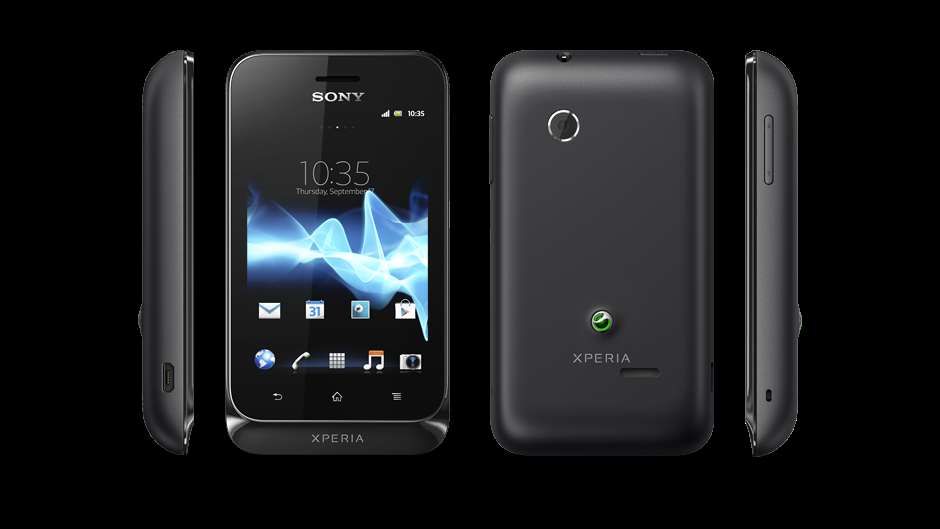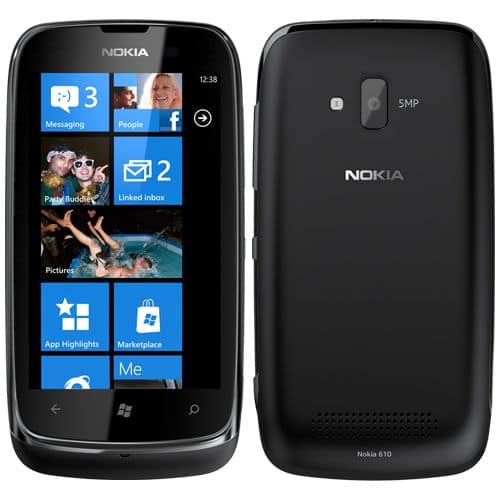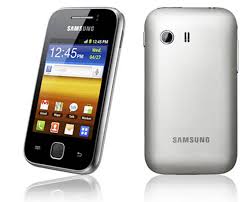Table of Contents
LG Optimus E400
The LG Optimus E400 is also known as the LG Optimus L3. Being the cheapest product in the Korean manufacturer’s L-series smartphone, the E400 targets low-income people willing to experience new technologies. The machine features a 3.2-inch multi-touch display, 320×240 resolution, an 800-Mhz single-core CPU, 384 MB RAM, 1 GB of internal memory, and a 3.2-megapixel camera.
E400 was shipped with Android 2.3.6 OS. The selling point of the device is the rectangular four-sided battery having the same capacity of 1500 mAh for a very long time as its counterparts in the same price segment. But the phone only supports 1 SIM card. If 2 SIM cards are needed, the possible alternative could be the LG Optimus E405, which is the updated version of the LG Optimus E400.
LG Optimus L3 E400/E405 Unlocked GSM Phone with Android 2.3 OS, Touchscreen, 3.15MP Camera, GPS, Wi-Fi, Bluetooth Touch Screen White International Version: Buy it now
Introduction
The LG Optimus E400 was an entry-level smartphone released in April 2010. Its targets were emerging markets, where the smartphone concept was still gaining ground. Due to this particular market constitution, their competitors were other entry-level phones in and around the $290 price range.
Design and Build Quality
About aesthetics, the Optimus E400 was somewhat dulled by its plasticky feel. It maintained a generally adequate level of ergonomics but somehow managed to deliver that plastic-y feeling in the holding. Any unique features would have to include the seven playful colors available for the back cover.
Display
This is the screen to be proud of on a $250 phone; its 3.2 inches, resolution of 320 x 480 pixels, brightness, viewing angles, and contrast all conspire somewhat in harmony to allow reasonable viewing in any illumination whatsoever.
Performance
The performance of highest type is rather straightforward: it is more or less on the level of Snapdragon S1, with some 512 MB of RAM and 512 MB of internal storage. Benchmarking is useful when comparing the processor clock speeds, real-world multitasking, gaming, and multimedia experiences.
Software and User Interface
The LG Optimus E400 runs on Android 2.2 Froyo-based OS. From the user experience point of view, it is not pure Android; rather, there is some skinning on the UI. It comes somewhat pre-bundled with LG proprietary apps along with a few standard apps and features the usual array of Android enhancements.
Camera Quality
The camera shine in specs from the motor of the device was a 3.0-megapixel rear camera, which, in good lighting, would shoot quite decent photos. It will record videos but without autofocus. It also has panorama, HDR, and A-GPS.
Battery Life
The battery capacity is around average for such a device. The amount of power draw, standard use cases, screen-on time, and some power-saving methods have been presented here. The different times under various usage patterns have been given on how long the device lasts on a full charge.
Connectivity
Address connectivity possibilities, from cellular network support to Wi-Fi: How accurate is the Bluetooth and GPS performance, and whatever other characteristics relevant to connectivity.
Audio and Multimedia
Evaluate the sound quality through the speakers, the headphone jack, multimedia playing machines, audio and video file formats supported, and any extra features like audio equalizer, surround sound effects, and so on.
Additional Features
Include any unique features such as expandable storage, dual SIM, NFC (if supported), sensors, and any other interesting capabilities.
Pros
Summarize the strengths of the LG Optimus E400 from the different category evaluations.
Cons
Point out its shortcomings or areas the device is lacking when compared to its competition or in user-expectation terms.
Conclusion
Give your final word on the device weighing in its performance, features, build quality, pricing, and general capability for its target group. Discuss any worries in durability or possible concerns that they may face after long-period usage.
Recommendation
Make some recommendations of whom should be interested in the use of the LG Optimus E400, given the drawbacks and benefits.
References
Provide the sources or references used for any factual information or comparisons made throughout the review.
This structure will help you to systematically review the LG Optimus E400, covering all the essentials exhaustively.
Nokia Lumia 610
Lumia 610 by Nokia has been the cheapest Windows Phone product ever since its launch. To put it plainly, the phone is configured very modestly. Powering the Lumia 610 is Qualcomm’s single-core CPU working at 800 MHz that is supported by 256 MB of RAM, a 5-megapixel camera, and 4GB of internal memory with no memory card support. The probably biggest highlight should be the Windows Phone 7.5 OS with a 3.7-inch display.
Nokia Lumia 610 8GB 3G Windows 7.5 Smartphone w/ 5MP Camera – Black: Buy it now
Introduction
Start by introducing the Nokia Lumia 610 with considerations for release date, market niche, and position in the smartphone market at the time of its release.
Design and Build Quality
Speak of the design theme of the Lumia, the materials applied, build quality, ergonomics, and looks. Mention anything that is interesting about the design or innovations.
Display
Comment on display quality versus resolution, and compare that to brightness, color reproduction, viewing angles, etc. Discuss how well it will perform for web browsing, reading, and multimedia consumption.
Performance
Judge its performance-perhaps the Qualcomm Snapdragon S1 processor with 256 MB RAM, and around 8 GB internal storage for typical user scenarios and if available, recent benchmarking results in launching apps, multitasking, general use, and other measures.
Software and User Interface
Describe which version of Windows Phone OS it actually runs and gave the UI design, app ecosystem, and user experience on it. The features and shortcomings of the Windows Phone platform back then can also be part of this section.
Camera Quality
Examine the function of the camera-images from different light settings, some additional features maybe autofocus, LED flash, video recording.
Battery Life
Discuss the battery capacity and other pertinent details such as common use cases, screen-on time, and power-saving features implemented by the device. Moreover, give detailed insights into how long the device lasts on a single charge under divergent use cases.
Connectivity
Talk about aspects concerning connectivity such as cellular network support, Wi-Fi performance, Bluetooth, GPS accuracies, or any other relevant connectivity features; discuss data speeds and reliability.
Audio and Multimedia
Discuss speaker quality and headphone jack capabilities alike. They also discuss media playback capabilities: Supported audio and video formats and enhancements-Dolby sound, equalizer, and the like.
Additional Features
Discuss any notable features like expandable storage, NFC (if any), sensors, or additional unique functionalities related to the Nokia Lumia 610.
Pros
Briefly discuss the strong points noted while going through the different categories related to the Nokia Lumia 610.
Cons
Talk about the shortcomings or limitations when compared with those of competitors or with respect to user expectations.
Final Verdict
Give the final verdict considering performance, features, build quality, price-value ratio, and the overall suitability for its intended audience. Speak of any long term-durability concerns or possible glitches that users may face.
Recommendations
Recommendations of who really needs to use Nokia Lumia 610, weighing the pros and cons of the device.
References
List any sources or references used for factual information or comparisons made throughout the review.
With this structure as a guide, you will be able to write a detailed and comprehensive review of the Nokia Lumia 610, covering all pertinent features, thereby imparting a good amount of information to the readers.
Sony Xperia Tipo
Xperia Tipo is a rare phone product that Sony devoted to the popular segment. The basic configuration is similar to low-cost smartphones like the 800 MHz single-core CPU, 3.2-inch screen, 3.2-inch camera, and 1500 mAh battery. It runs Android 4.0.4 Ice Cream Sandwich, so its RAM is raised to 512 MB, and its internal memory is up to 2.5 GB. You can buy the upgraded 2 SIM phones of this phone are Sony Xperia Tipo Duos.
Sony Xperia Tipo ST21i Unlocked (White) International Version No Warranty: Buy it now
Introduction
The Sony Xperia Tipo Arrives- release date, target group, and an overview of its market class at the time of release.
Design and Build Quality
Style, materials used, build quality, feel, ergonomics-the Xperia Tipo needs those descriptions. Special design elements or innovations-pop them in!
Display
Discussing the display quality: resolution, brightness, color reproduction, and viewing angles-with respect to its price class. Are they good enough to use for browsing, reading, and streaming?
Performance
Discuss the performance of the Xperia Tipo considering the processor (probably a Qualcomm Snapdragon S1), RAM, and internal storage. Provide a brief overview of benchmarks and how the phone performs running applications, switching between them, and common usage scenarios.
Software and User Interface
Talk about the OS version it runs, probably Android 4.0 Ice Cream Sandwich, the UI provided by Sony, the app ecosystem (Google Play Store), and the user experience. Mention any extras offered by Sony.
Camera Quality
Assess camera performance: megapixel count, image quality in varying light conditions, video recording capability, and any camera features-worth mentioning: autofocus, LED flash, and so on.
Battery Life
Battery power and capacity were discussed. Charging profiles under different usage scenarios may be considered. For example, screen-on time is discussed along with any power-saving features implemented in the hardware or software. Insights about how long the device lasts under various usage conditions on a single charge should be given in each section.
Connectivity
In the connectivity section, evaluate cellular network support (including vendor support, dual-band, etc.), Wi-Fi performance/compatibility, and connection with Bluetooth devices in terms of their data speeds and accuracy and reliability when it comes to GPS and other similar connectivity features.
Audio and Multimedia
It was mentioned that speakers, the headphone jack, and the audio quality were tested. Additionally, multimedia playback capabilities, supported audio and video formats, and audio enhancements such as an equalizer or virtual surround sound can be evaluated.
Additional Features
Cover anything that stands out, such as the presence of expandable storage or NFC (if supported) and sensors or anything particular to the Sony Xperia Tipo.
Pros
Summarize the merits of the Sony Xperia Tipo based on assessments from different categories.
Cons
Touch on what loosen the device from its competitors or those contrarily weigh on user expectations.
Conclusion
Present a final verdict on the Sony Xperia Tipo considering its performance, features, build quality, value for money, and overall suitability for its intended audience. Potential long-term durability concerns or issues that future consumers might face can be addressed here.
Recommendations
Make recommendations about whom would best benefit from using the Sony Xperia Tipo in view of the phones’ strengths and weakness.
References
Any sources or references used for factual information or for comparison during the review must be listed.
In following this outline, one can write a thorough review of the Sony Xperia Tipo, thereby providing readers with detailed insight into its capabilities and assisting them in making an informed decision about the device.
Samsung Galaxy Y
Samsung Galaxy Y was born to replace the popular Samsung Galaxy Mini brother in popular phones. And as expected, Galaxy Y has created a fever in the market for a long time. Although the configuration is very modest with the CPU Broadcom BCM21553 830 MHz (not Flash Player), 290MB RAM, 3-inch screen, 2-megapixel camera, … but it’s cheap. The earliest appeared in this segment, so the machine has attracted a large number of users.
Like the LG Optimus E400, the Sony Xperia Tipo, the Samsung Galaxy Y has an upgraded version called the Galaxy Torino equipped with a dual SIM feature and a slightly larger 3.18 inch.
Introduction
Introduce the Samsung Galaxy Y, including its release date, the target audience, and marketing scope available at the time of release.
Design and Build Quality
Discuss the design language, materials, build quality, ergonomics, and overall aesthetic appeal of the Samsung Galaxy Y, including any special design features or innovations.
Display
Discuss the display quality, resolution, brightness, color reproduction, and viewing angles, while also making comparisons to what else is available in its price range. Consider tasks like web browsing, reading, and media consumption.
Performance
Discuss the performance of the Samsung Galaxy Y relative to its processor, an entry-level ARM Cortex-A5, RAM, and internal storage. Compare benchmark scores (if available) and real-world performance while launching apps, multitasking, and in everyday use.
Software and User Interface
Discuss the Android OS version it runs on (most probably Android 2.3 Gingerbread), the user interface (TouchWiz UI), app ecosystem (Google Play Store), and user experience. Note any software features from Samsung that might be unique or enhanced.
Camera Quality
Evaluate the camera’s performance in the megapixel count, image quality in different lighting situations, video-recording capabilities, and other camera features like autofocus and LED flash.
Battery Life
Consequently, curious to know about the vast battery capacity, typical usage scenarios, screen-on time, and any power-saving measures taken. One must consider how far on a single charge the device might go through various usage patterns.
Connectivity
Discussions on areas with cellular network support, Wi-Fi performance, Bluetooth connectivity, GPS accuracy, and any other connectivity features. Talks about data speeds and their reliability.
Audio-Visual and Multimedia
Assess speaker and headphone jack output, multimedia playback capabilities, formats supported in both audio and video, and enhancements such as audio equalizers and maybe even virtual surround sound.
Other Features
Mention expansible storage, dual SIM capability (if any), sensors, or other features worthy of mention next to the Samsung Galaxy Y.
Pros
Summarize the positives for the Samsung Galaxy Y as considered in the review across various categories.
Cons
Drawbacks to the device in comparison to what competitors have, or to the expectations of potential users.
Conclusion
State the final verdict from the point of view of the Samsung Galaxy Y vis-à-vis performance, features, build quality, value for money, and as to how well it fits the targeted group. This may also mention long-term durability issues or concerns or problems that users may expect.
Recommendations
Give a brief view of who would most likely gain from using the Samsung Galaxy Y, given its pros and cons.
References
Include any sources or references used for factual information or comparisons made throughout the review.
Following the above guidelines, a worthy review of the Samsung Galaxy Y can be prepared, providing readers with exhaustive details and analyses regarding its capabilities that enable them to make an informed decision regarding the device.



